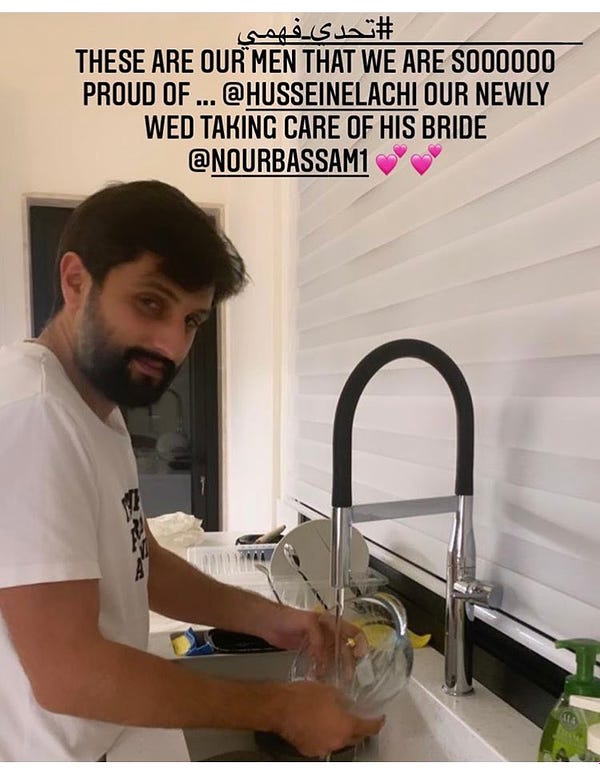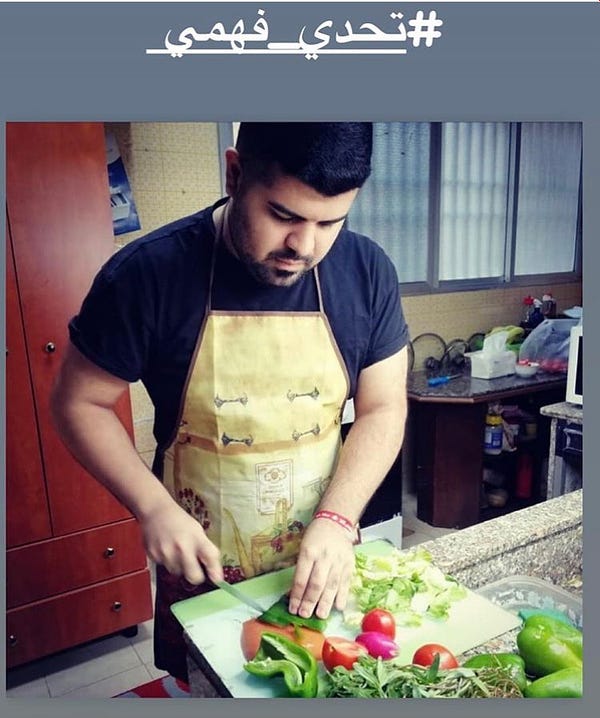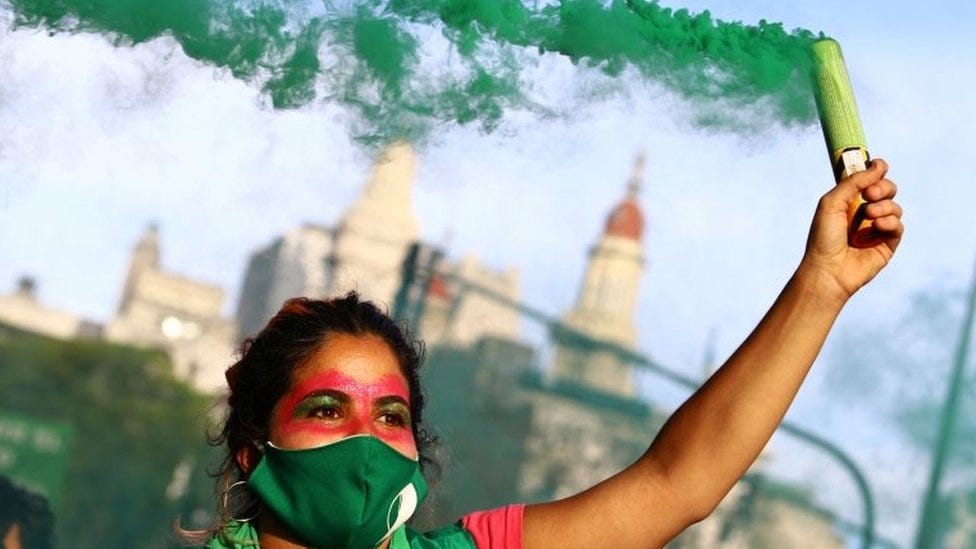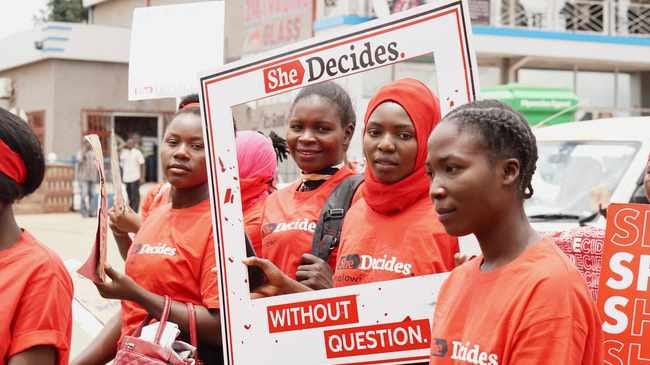Global Roundup: Abortion Rights in Argentina, Menstrual Products for Maoist Fighters in India, Protesting Rape in Malawi, Women Will Not Cook a Little in Lebanon,
Compiled and written by Sahra
Street rallies have been part of the campaign to legalise abortion Via Reuters
The president of Argentina Alberto Fernandez sent a bill to congress on Tuesday seeking to legalize abortion in the country. This a major step for Argentina, a conservative nation where the procedure is currently illegal and stigmatized. He says the measure will help save lives, as every year almost 40,000 women are treated in hospital after botched illegal procedures.
The new bill will legalize the “voluntary interruption” of pregnancy and guarantee that the government health care system provides women with access to the procedure across the country. Currently abortion is illegal except in cases of rape and health risks, but activists say that even women who meet those requirements often meet obstacles, especially in rural and/ or predominantly conservative areas. Outside the exceptions, women who have an abortion and anyone who performs them illegally could go to prison.
The debate is not saying yes or no to abortion…The dilemma that we must overcome is whether abortions are performed clandestinely or in the Argentine health system - Alberto Fernandez
In 2018 the country came close to legalizing abortion when the lower house approved a bill that would legalize the termination of pregnancies up to 14 weeks. The senate later rejected the bill after a campaign from the Catholic Church. Fernandez took over from his conservative predecessor Mauricio Macri last year. He had said in March that he was planning to send the bill to Congress but his pledge was marred by the arrival of the coronavirus, leading to one of the strictest lockdowns in the world. Fernandez was finally able to deliver on that promise yesterday.
Congress must rise to the occasion and not miss the opportunity to recognize the rights of women, girls and others who can become pregnant to make free decisions about their bodies - Mariela Belski, executive director of Amnesty International Argentina
Argentines who have protested in their thousands for reform are hoping that the president's support this time will be decisive.
The debate surrounding abortion in Argentina was reignited last year, when an 11-year-old rape victim gave birth by C-section.
The girl, who had been raped by her grandmother's 65-year-old partner, had requested an abortion but the procedure was repeatedly delayed over questions about the identity of her guardian.
————————-
ARCHIVE PHOTO: Tribal women return home after fetching water in a refugee camp in the Maoist prone forest area near Bhairamgarh village, about 400 km (248 miles) south of the central Indian city of Raipur March 18, 2007. REUTERS/Parth Sanya
A group of activists in the central Indian state of Chhattisgarh called the New Peace Process have begun distributing reusable sanitary napkins and menstrual cups to leftist fighters waging a decades-long insurgency in one of the country’s poorest states in a bid to engage them in peace efforts.
There are about 2,500 women among the guerrillas who say they are fighting government forces in the jungles of central and eastern India for the rights of poor farmers and landless labourers.
Can we break violence and start talking? We are trying to create an environment against violence and violent politics and bring peace - organiser Shubhranshu Chowdhary
“The activists believe that once these women convince their male counterparts, the process of engaging with the peace process may become possible.” Chowdhary said the idea, timed to coincide with the Diwali festival, was inspired by a scheme to engage rebels in Colombia by sending them Christmas presents.
Indian police, often the targets of attacks by the guerrilla fighters known as Naxalites after the village in West Bengal state where the movement began, are not supportive of the move. They claim that they will only engage when the fighters disregard all forms of violence. They also added that they cannot afford to give comfort to those fighting against the state. Menstrual hygiene products are not luxury goods that seek to provide comfort but a necessity for a bodily function!
————————
Young activists at the ’She Decides’ march against sexual violence in Lilongwe, Malawi. File picture: Alice McCool/Thomson Reuters Foundation
Malawians took to the streets on Monday to demand tougher penalties on rape and demand increased protection for women. The recent protest is a continuation of the months of protests over sexual abuse in the country. The protestors presented a petition to the authorities in the cities of Lilongwe, Blantyre and Mzuzu. They called on the government to set up a sex offenders registry, women’s shelters, special courts for sexual crimes and overhaul school sex education.
Not much is being is being done... to send an absolutely clear message to Malawian men that sexual violence will not be tolerated and the consequences of such crime will be harsh penalties…We have heard enough rhetoric, it is time for action and the time is right now - the petition
According to the United Nations, about 38% of Malawian women between 15 and 49 years of age have experienced sexual violence at least once in their lives. It was only earlier this month after the public outrage and concern that President Lazarus Chakwera was prompted to create a taskforce to investigate sexual violence. That followed sexual misconduct accusations against Aubrey Sumbuleta, the director of Malawi Broadcasting Corporation, with rights groups calling for an urgent investigation into the organisation and other state entities.
Many people prefer to suffer in silence especially when they are victimised by those in power or their supervisors - Teresa Ndanga, Malawi chairperson, Media Institute of Southern Africa
Six women have come forward with accusations against Sumbuleta, who was suspended from his post by the government last month, Information Minister Gospel Kazako said.
—————————
Lebanese interior minister Mohamed Fahmi was ridiculed on social media following his sexist remark [Getty] Via NewArab.com
Lebanese men and women took to social media to mock and criticize the minister of interior after after he suggested the solution to a ban on deliveries during a coronavirus lockdown was for women to start cooking. The news came after the announcement of a two-week partial lockdown starting Saturday to lower the curve and manage the spread of Covid19. After a journalist asked minister Mohamed Fahmi what Lebanese people should do on Sunday since the lockdown suspended food deliveries from restaurants and supermarkets he responded with “Let women cook a little”.
Appalled women reacted by lambasting the minister's sexist comment on social media, and vowing they were #Not_cooking_on_Sunday.
"#Sexism results in deep rooted repression & discrimination against us women, national 'leaders' disgracefully support inequalities," associate professor Carmen Geha responded on Twitter.
"I will cook happily the day they pick up and recycle garbage," she added, referring to oft-criticised public services.
Lebanese men joined in posting images of themselves dicing up vegetables or shaking pans on the stove, as they took on the #Fahmi_challenge - to be a man and cook, to dispel the sexist notion that cooking was women’s job.





"I apologise, honourable minister, that today I cooked for my sons," one user, a divorced man raising his sons on his own, wrote beside a picture of him serving a meal on Facebook.
"I apologise because their mother is a doctor like me and the head of a department in France, and I and my children are very proud of her."
——————————
Photo Via techround.co.uk
Kirin Hothi and Sonam Kaur are carving a virtual space for South Asian women to connect with one another. Together they cofound NotYourWife, a media platform focused on amplifying and celebrating the voices of South Asian women. They launched 6 months ago during the lockdown period and have since built a community of over 20k women. The two met in 2014 and have kept in touch since then, but over the years they struggled to find a space online that centers South Asian women.
Over the years, we struggled to find an online space that we could really relate to. A space where we could bond over our love for our culture, but also openly and honestly discuss the complexities and unique experiences faced by South Asian women and diasporia South Asians.
The South Asian diaspora is estimated to be around 24 million, which only emphasizes the need for and importance of having platforms like this one. After realizing that they need to be the ones to create the things they wish had existed, NotYourWife was born soon after. They hope to grow even more in the future and continue to hold South Asian women at the center of their platform.
————————
Sahra is currently pursuing her undergrad in Sociology, Feminism and Gender studies. She plans to redefine the terms of life to suit her needs and those around her by challenging the patriarchy and other oppressive systems that shape our world. She loves to paint, laugh and spend time with her loved ones.







